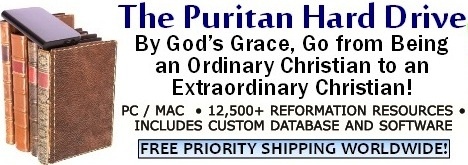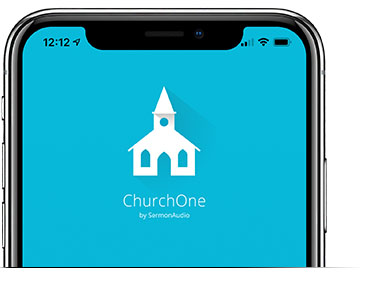 Loading... Please wait...
Loading... Please wait...- SWRB Home
-
Free Resources
- Short Listings Of Free Reformation & Creation Resources
- Free Reformed, Puritan, Covenanter and Creationist Videos
- Thousands of Links to Free Audio, Video and Printed Resources
- Free Puritan Books, Reformed MP3s, and Calvinist Videos
- Puritan Quotes, Free Reformation MP3s, Reformed Books and Calvinist Videos From PuritanDownloads.com On FaceBook
- Shipping & Returns
- Blog
- Privacy Policy
- Contact Us
- Payment Options
- Help
-
About Us
- Sitemap
Pastor Scott Brown, on the left in the video above, is the Director of the National Center for Family-Integrated Churches (NCFIC)
Resource Categories
- PURITAN HARD DRIVE REVIEWS
- PASTOR ROB VENTURA ON THE PURITAN HARD DRIVE
- DR. VODDIE BAUCHAM, JR. ON THE PURITAN HARD DRIVE
- R. C. SPROUL ON SWRB
- DR. JOEL R. BEEKE ON THE PURITAN HARD DRIVE
- PASTOR GREG L. PRICE ON THE PURITAN HARD DRIVE
- DR. MATTHEW MCMAHON ON THE PURITAN HARD DRIVE
- PASTOR SCOTT BROWN ON THE PURITAN HARD DRIVE
- PASTOR W. J. MENCAROW ON THE PURITAN HARD DRIVE
- JOAQUIN FERNANDEZ ON THE PURITAN HARD DRIVE
- PASTOR DAVID SILVERSIDES ON THE PURITAN HARD DRIVE
- JOHN HENDRYX ON THE PURITAN HARD DRIVE
- PASTOR KEVIN GUILLORY ON THE PURITAN HARD DRIVE
- RICHARD BENNETT ON THE PURITAN HARD DRIVE
- DR. KENNY RHODES ON THE PURITAN HARD DRIVE
- JUSTIN RAWSON ON THE PURITAN HARD DRIVE
- PASTOR JAMES WALLACE ON THE PURITAN HARD DRIVE
- PASTOR RICHARD GAGNON ON THE PURITAN HARD DRIVE
- PASTOR JOE HAYNES ON THE PURITAN HARD DRIVE
- DR. STEVEN DILDAY ON THE PURITAN HARD DRIVE
- PASTOR ANDREW COMPTON ON THE PURITAN HARD DRIVE
- TERENCE ELLARD ON THE PURITAN HARD DRIVE
- PASTOR JERRY JOHNSON ON THE PURITAN HARD DRIVE
- PASTOR DAVID PETRIE ON THE PURITAN HARD DRIVE
- JIM DODSON ON THE PURITAN HARD DRIVE
- PASTOR BRIAN SCHWERTLEY ON THE PURITAN HARD DRIVE
- PASTOR PHIL GIBSON ON THE PURITAN HARD DRIVE
- MEL R. EVERINGHAM II ON THE PURITAN HARD DRIVE
- PAUL BLYTH ON THE PURITAN HARD DRIVE
- STEVE KETTLER ON THE PURITAN HARD DRIVE
- D. M. (CALIFORNIA) ON THE PURITAN HARD DRIVE
- MICHAEL CAUGHRAN ON THE PURITAN HARD DRIVE
- WIILIAM NOPPER IV ON THE PURITAN HARD DRIVE
- LINDA THERIAULT ON THE PURITAN HARD DRIVE
- WILLIAM WARNOCK ON THE PURITAN HARD DRIVE
- ROBERT KOH ON THE PURITAN HARD DRIVE
- WHAT'S ON THE PURITAN HARD DRIVE?
- ALL PURITAN HARD DRIVE VIDEOS
- PHD-ODE INSTALLATION VIDEOS
- COMMENTS ON SWRB
- ALL PURITAN QUOTE VIDEOS
- PURITAN HARD DRIVE SCREENSHOTS
- PURITAN HARD DRIVE MINISTRY AND DONATION OFFERS
- TABLE OF RESOURCE CATEGORIES
- Advanced Studies
- SWRB SERMONAUDIO MOBILE APP
- Apologetics
- Assurance
- Attributes and Holiness of God
- Augustine
- Banner of Truth
- Baptism
- Beginners
- Bibles (Geneva, KJV, Hexapla, etc.)
- Biblical Counseling
- BIBLICAL HD COLLECTION
- Biblical Interpretation (Hermeneutics)
- Biographies and Autobiographies
- Calvinism and the Sovereignty of God
- CALVINISM HD COLLECTION
- CALVINIST CLASSICS HD COLLECTION
- Charles Spurgeon
- Children's Books
- CHRISTIAN EDUCATION HD COLLECTION
- Christian History
- Church Government
- Civil Government and Resistance
- CLASSIC CHRISTIAN HD COLLECTION
- Classic Puritan and Reformed Sets
- Commentaries
- Contemporary Issues
- Covenant Theology and Covenanting
- COVENANTER HD COLLECTION
- Covenanters and Covenanted Reformation
- Creation and Creationism
- Creeds, Confessions and Covenants
- Cults, False Religions, Psychology, Humanism
- Dealing with Affliction, Suffering, and Sickness
- Debates
- Dutch Reformed
- Education and Home Schooling
- English Puritans, Covenanters and Reformers
- Family, Children, Home, and Family Worship
- First Reformation
- Five Points of Calvinism (TULIP)
- For Pastors and Elders
- For Seminary Students
- FREE PURITAN & REFORMATION MP3 AUDIO SERMONS/BOOKS
- FREE PURITAN BOOKS, REFORMATION MP3s, PDFs, VIDEOs
- George Gillespie
- God's Law, The Ten Commandments, etc.
- Greg L. Price on Headcoverings
- Heaven, Hell and the Final Judgment
- Holy Days (Lord's Day, Christmas, Easter, etc.)
- HOME SCHOOL HD COLLECTION
- Intermediate Studies
- John Bunyan
- John Calvin
- John Knox
- John Owen
- Jonathan Edwards
- Justification
- Languages, Dictionaries, Reference, etc.
- LOOK WHO LOVES THE PURITAN HARD DRIVE
- Lord's Supper (Communion)
- Marriage, Courtship, etc.
- Martin Luther and Lutheranism
- Martyrs and Persecution
- Other Protestant Works
- Predestination and Providence
- PRESBYTERIAN HD COLLECTION
- Presbyterians and Presbyterianism
- Prophecy, Antichrist, and Eschatology
- PROTESTANT HD COLLECTION
- PSALM SINGING MP3s (COMPLETE SET)
- Psalters, Psalm Singing and Music
- Puritan Facts
- PURITAN FAST SERMONS (1640-1653) - 34 VOLS SET
- Puritan Fast Sermons 1640-1653
- Puritans and Puritanism
- PURITAN HARD DRIVE
- REFORMATION HD COLLECTION
- Reformation History
- Reformed and Puritan Classics
- Reformed Baptist
- REFORMED BAPTIST HD COLLECTION
- REFORMED HD COLLECTION
- REFORMED PRESBYTERIAN HD COLLECTION
- Reformed Presbytery, RPNA Protesters, etc.
- Reformed Theology
- Reformed Worship, The Regulative Principle, etc.
- Roman Catholicism, the Jesuits, Islam, etc.
- Salvation and Evangelism
- Samuel Rutherford
- Sanctification, Prayer and Holiness
- Scottish Covenanters
- Scottish Presbyterianism
- Scripture Song MP3s (Psalms and Bibles Verses)
- Second Reformation
- Separation, Unity, Uniformity, etc.
- Sermons and Sermon Collections
- Solemn League and Covenant
- Theology and Doctrine
- Third Reformation
- Thomas Watson
- Westminster Confession, Assembly and Divines
- Authors (All A to Z)
Phone Orders:
(780) 450-3730
To obtain free Reformation books, Puritan MP3s and Calvinistic videos, SWRB discount coupons, etc., add yourself to SWRB's Puritan and Reformed email list by using the form above.
- Home
- Free Resources
- Thousands of Links to Free Audio, Video and Printed Resources
- Are Easter, Christmas, Other Popish/Pagan Holy Days (Not Authorized In the Bible), Man-Made Hymns and Musical Instruments In Worship, Etc., Idols? - According To the Classic Reformed View Of The Second Commandment (Free Reformed MP3s, Videos, Books)
Are Easter, Christmas, Other Popish/Pagan Holy Days (Not Authorized In the Bible), Man-Made Hymns and Musical Instruments In Worship, Etc., Idols? -- According To the Classic Reformed View Of The Second Commandment or What Is Now Called the Regulative Principle Of Worship (Free Reformed MP3s, Videos, Books, Etc.)
Are Easter, Christmas, Other Popish/Pagan Holy Days (Not Authorized In the Bible), Man-Made Hymns and Musical Instruments In Worship, Etc., Idols? An Exposition Of the Westminster Larger (Q&A 109) and Shorter (Q&A 51) Catechisms Concerning Sins Forbidden In The Second Commandment (Regulative Principle Of Worship) By Jim Dodson (Free MP3)
One of the best teaching MP3s about worship that we have ever heard, based solidly on the Scriptures as they are faithfully reflected in the two best Reformed catechisms ever produced -- the Westminster Larger and Shorter catechisms. If you want to grow closer to God and be more faithful in your worship of the Most High, listening to this message is a splendid way (with God's blessing) to take a big step in that direction.
All Messages In Jim Dodson's Series On the Westminster Larger and Shorter Catechisms (Free MP3s)
In 1899, the General Assembly of the PCUS was overtured to give a "pronounced and explicit deliverance" against the recognition of "Christmas and Easter as religious days." Even at this late date, the answer came back in a solid manner: "There is no warrant in Scripture for the observance of Christmas and Easter as holydays, rather the contrary (see Gal. 4:9-11; Col. 2:16-21), and such observance is contrary to the principles of the Reformed faith, conducive to will-worship, and not in harmony with the simplicity of the Gospel of Jesus Christ." - Kevin Reed, Christmas: An Historical Survey Regarding Its Origins and Opposition to It (Free Online Book), emphases added.
We are the Easter people. - Pope John Paul II
Christmas Is A Roman Catholic Missions Strategy (Free Reformed MP3s, Books, etc.)
Christmas was not celebrated by the apostolic church. It was not celebrated during the first few centuries of the church. As late as A.D. 245, Origen (Hom. 8 on Leviticus) repudiated the idea of keeping the birthday of Christ, "as if he were a king Pharaoh." By the middle of the 4th century, many churches in the Latin west were celebrating Christmas.During the 5th century, Christmas became an official Roman Catholic holy day. In A.D. 534, Christmas was recognized as an official holy day by the Roman state. The reason that Christmas became a church holy day has nothing to do with the Bible. The Bible does not give the date of Christ's birth. Nowhere in the Bible are we commanded to celebrate Christmas. Christmas (as well as many other pagan practices) was adopted by the Roman church as a missionary strategy. - From: The Regulative Principle of Worship and Christmas by Brian Schwertley (Free Online Book)
The Puritans On Exclusive Psalmody (Free Reformed MP3s, Videos, Books, etc.)
Hymns of human composition are used so commonly now in public worship by Presbyterian churches that it is difficult to believe that the practice is not a hundred years old, and that in some of the churches it is of very recent date. On the supposition that it is good and dutiful and wise to sing such hymns in worship, it is equally difficult to account for the neglect of the churches at the time of the Reformation, and for generations afterwards. What could have so blinded the reformers as to make them reject hymns and sing the Psalms alone? How could the Westminster Divines, in framing their Confession of Faith and Directory for Worship, have been so unanimous in the blunder that the service of praise is to consist of the 'singing of Psalms?' And apart from the aspect of duty, how could the Presbyterian churches, for about a hundred and fifty or two hundred years after the Westminster Assembly, have been so insensible to the power of hymns as an attractive addition to their public services? We cannot by any means understand how it was that, if it was dutiful to use hymns in worship, the reformers did not discover the Scriptural warrant for the duty, especially as hymns had been used for centuries by the Church of Rome. Nor can we understand how they rejected the hymns and used the Psalms alone, unless on the supposition that they believed the use of hymns to be part of the will-worship of Rome. If they were wrong on this point, then Rome and our modern Presbyterian churches are right. In that case, the Puritans and Covenanters were fanatics, and Romanists were truly enlightened! And most of our Presbyterian churches of the present day were fanatical too, and did not become truly enlightened and liberal till they got back to the Romish practice! - James Dick from Hymns and Hymn Books (1883, reprinted by Still Waters Revival Books) as excerpted from The Original Covenanter magazine (Dec, 1883, vol. 3, No. 12). Both items are on the Puritan Hard Drive.
John Girardeau, in his INSTRUMENTAL MUSIC IN THE PUBLIC WORSHIP OF THE CHURCH (pp. 63, 64, on the Puritan Hard Drive), citing John Calvin, writes,
"To sing the praises of God upon the harp and psaltery," says Calvin, "unquestionably formed a part of the training of the law and of the service of God under that dispensation of shadows and figures; but they are not now to be used in public thanksgiving." He says again: "With respect to the tabret, harp, and psaltery, we have formerly observed, and will find it necessary afterwards to repeat the same remark, that the Levites, under the law, were justified in making use of instrumental music in the worship of God; it having been his will to train his people, while they were yet tender and like children, by such rudiments until the coming of Christ. But now, when the clear light of the gospel has dissipated the shadows of the (ceremonial - ed.) law and taught us that God is to be served in a simpler form, it would be to act a foolish and mistaken part to imitate that which the prophet enjoined only upon those of his own time." He further observes: "We are to remember that the worship of God was never understood to consist in such outward services, which were only necessary to help forward a people as yet weak and rude in knowledge in the spiritual worship of God. A difference is to be observed in this respect between his people under the Old and under the New Testament; for now that Christ has appeared, and the church has reached full age, it were only to bury the light of the gospel should we introduce the shadows of a departed dispensation. From this it appears that the Papists, as I shall have occasion to show elsewhere, in employing instrumental music cannot be said so much to imitate the practice of God's ancient people as to ape it in a senseless and absurd manner, exhibiting a silly delight in that worship of the Old Testament which was figurative and terminated with the gospel."
But in vain they do worship me, teaching for doctrines the commandments of men. - The Lord Jesus Christ (Matthew 15:9, KJV)
John Calvin Quote on the Regulative Principle of Worship
"...which I commanded them not, neither came it into my heart."
"...God here cuts off from men every occasion for making evasions, since he condemns by this one phrase, "I have not commanded them," whatever the Jews devised. There is then no other argument needed to condemn superstitions, than that they are not commanded by God: for when men allow themselves to worship God according to their own fancies, and attend not to his commands, they pervert true religion. And if this principle was adopted by the Papists, all those fictitious modes of worship, in which they absurdly exercise themselves, would fall to the ground. It is indeed a horrible thing for the Papists to seek to discharge their duties towards God by performing their own superstitions. There is an immense number of them, as it is well known, and as it manifestly appears. Were they to admit this principle, that we cannot rightly worship God except by obeying his word, they would be delivered from their deep abyss of error. The Prophet's words then are very important, when he says, that God had commanded no such thing, and that it never came to his mind; as though he had said, that men assume too much wisdom, when they devise what he never required, nay, what he never knew."
- John Calvin, Commentary on Jeremiah 7:31, emphases added.
Pastor Greg L. Price Reviews and Recommends
the Puritan Hard Drive

Pastor Greg L. Price
I was one of those who had profited much from using the plethora of out-of-print Reformation materials offered by Still Waters Revival Books in the 62 CDs (Puritan CDs and Reformation CDs) for a number of years in my ministry -- works that I could only have found in select libraries (usually hundreds of miles away from my residence).
With the CDs, it took a little while to go to the index of each set, locate the documents I needed, and then find the correct CD. Of course, the time was always well spent in finding that particular document that I needed.
However, now that I have the Puritan Hard Drive, I am able to use my time much more efficiently in finding that particular document I need by quickly searching for it and finding it in a matter of seconds. It's like going from "dial up" to "high-speed" Internet!
And for all of those documents that have a font that are in block letters, I am able to simply cut and paste from the Puritan Hard Drive to my own document with ease.
Amazing surprises do come in small packages!
If you want to understand Reformed theology (i.e., the whole counsel of God) the Puritan Hard Drive is unsurpassed, outside the Bible itself. The First and Second Reformations gave us the most faithful Scriptural teaching and preaching since the time of the Apostles, and there is no other resource, outside Scripture itself, where you can find so much of God's truth as in the Puritan Hard Drive.
May the Lord continue to use this most profitable tool to promote a Third Reformation that encompasses the whole world (Isaiah 2:2-4)!
- Pastor Greg L. Price (Covenanted Presbyterian Pastor, Author, Theologian, etc.) Free online books, MP3s and videos by Greg Price at https://www.swrb.com/newslett/freebook/gprice.htm
Are Easter, Christmas, Other Popish/Pagan Holy Days (Not Authorized In the Bible), Man-Made Hymns and Musical Instruments In Worship, Etc., Idols? -- According To the Classic Reformed View Of The Second Commandment or What Is Now Called the Regulative Principle Of Worship (Free Reformed MP3s, Videos, Books, Etc.)
Phone Orders:
(780) 450-3730
To obtain free Reformation books, Puritan MP3s and Calvinistic videos, SWRB discount coupons, etc., add yourself to SWRB's Puritan and Reformed email list by using the form above.
Current Top Sellers
-
1
-
2Puritan Hard Drive - On Demand Edition for Windows
$2,897.97$597.97 -
3Puritan Hard Drive - On Demand Edition for Mac
$2,897.97$597.97 -
4
-
5















































